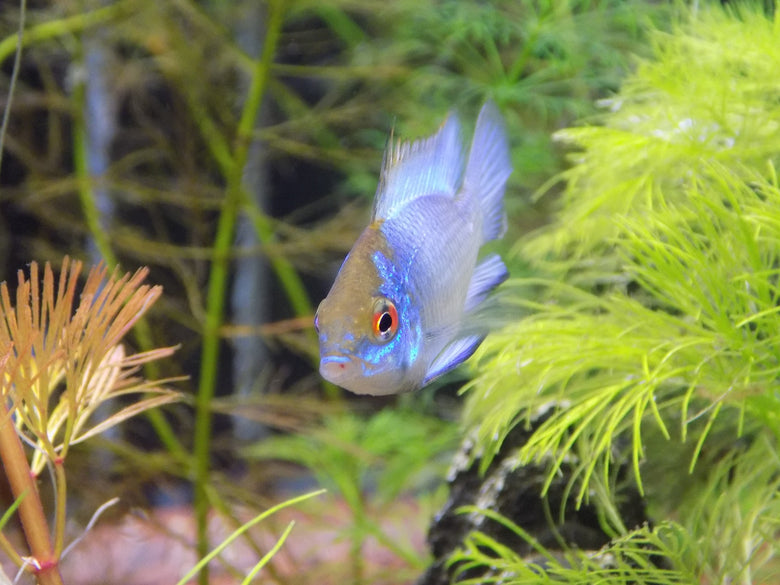
A guide to water hardness in ponds and aquariums.
Many new pond and aquarium hobbyists aren’t aware of GH & KH (or water hardness to put it simply), and as a result don’t understand the vital role it plays in fish health. GH or ‘General Hardness’ refers to the dissolved levels of magnesium and calcium ions in the water, while KH or ‘Carbonate Hardness’ refers to the measure of carbonates and bicarbonates dissolved in the water.
Naturally occurring water in the form of streams, rivers, ponds, lakes etc. is rarely purified in the distilled water sense. Instead it is packed full of dissolved salts, buffers and nutrients, and the levels of these will vary according to geography and local conditions. Fish of all types worldwide, have evolved over millions of years to inhabit very specific water conditions, and it is our job as pond/aquarium keepers to try and replicate these conditions in order to keep the fish happy and healthy.
For those with limited knowledge or eagerness to keep exotic fish, the easiest approach is to select fish which are suitable for the local (dechlorinated) tap water. Alternatively, advanced aquarists or pond keepers may choose to match the water chemistry to match the selected fish’s requirements. Not everyone however is blessed with perfect tap water… In certain areas of the UK where the water is particularly soft, lacking any real mineral content (such as Manchester), pond and aquarium hobbyists may be forced to buffer their water, introducing minerals in the form of GH & KH in order to make it suitable for fish keeping.
GH and KH, are often intertwined with pH (a scale used to specify how acidic or alkaline a water-based solution is), which is another measurable factor in water chemistry, equally important to fish health. Although pH, GH & KH are separately measurable entities, it is difficult to adjust one parameter without effecting the others, which will be further explained below.
A pH of 7 is considered to be neutral while pH’s below 7 are considered acidic and pH’s above 7 are alkaline. To a fish keeper in any aspect (pond or aquarium), two aspects of pH are important:
- Rapid changes in pH can stress fish out and be detrimental to fish health. As a result, the pH of your pond or aquarium should remain relatively consistent and stable.
- As mentioned earlier, fish have spent millions of years evolving to live and thrive in specific water chemistry conditions. You will want to match the pH to the specific requirements of our fish. As a rule of thumb, you will be able to keep most species of fish without experiencing any issues, if your tap water is naturally neutral at a range between pH 6.5 and pH 7.5.
It is important to have a good KH in your pond or aquarium in order to keep pH steady and stable for your fish. The KH has a buffering capacity to neutralise nitric acid (produced from the nitrogen cycle). Without KH the water would become naturally acidic over time which could result in fish fatalities. In areas of the country with hard water, the buffering will be a natural occurrence. As mentioned earlier, areas of the country (such as Manchester) with soft water, will normally need to introduce KH to their pond or aquarium in order to keep pH consistent. For fish such as Malawi Cichlids which require more alkaline water (at around pH 8.3) additional levels of KH may need to be added. On the contrary many south American fish such as Discus, thrive in water of pH6 which is slightly acidic. In these instances, having KH in the water will have a detrimental impact on the fish.
Having suitable levels of GH and KH creates permeant hardness which helps most fish with osmoregulation. Osmoregulation is the active regulation of the osmotic pressure of an organism's body fluids, detected by osmoreceptors, to maintain the homeostasis of the organism's water content i.e. how the fish takes on water much like us drinking water. Koi Carp as an example, like relatively hard water (high GH), and may need GH introducing to the pond periodically to keep water conditions suitable if the tap water is naturally soft. GH ions are used up by the fish and are also lost during periodic water changes. Most tropical fish tanks prefer moderately hard water, and just like Koi keeping, may need this introducing in small doses periodically if your natural tap water is soft. Several species of South American fish such as Discus actually live naturally in soft water and so prefer low GH conditions. If you live in an area of the country with hard water, but want to keep soft water fish, there are several products on the market which can help reduce levels of GH in the water.
If you’re unsure about your local water hardness, we would always recommend having your water tested by our team of in-house professionals at Complete Koi & Aquatics. We can then follow this up with any advice required for fish keeping.
For any questions related to the above, please don't hesitate to contact Complete Koi & Aquatics:
Tel: 01204 582105
Email: info@completekoi.com
Address: Complete Koi & Aquatics, Unit 4, Tonge Bridge Way, Bolton, BL2 6BD